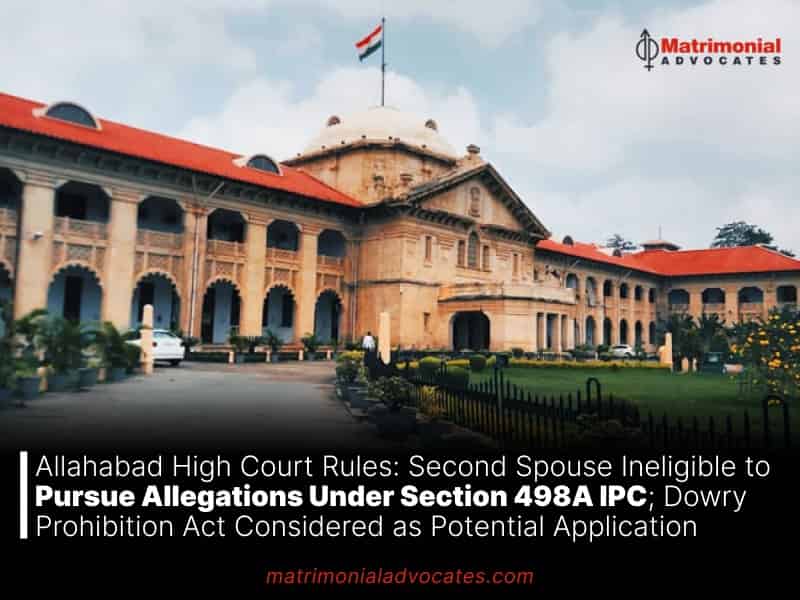
The Allahabad High Court has determined that a woman referred to as a ‘second wife’ cannot lodge a complaint under Section 498-A of the Indian Penal Code (which concerns cruelty) against her husband. However, if there’s a demand for dowry in such cases, the provisions of the Dowry Prohibition Act of 1961 might be invoked.
“…for the dowry, the performance of marriage is not necessary, and even a marriage contract is sufficient. If a male and female contracted for marriage and cohabiting together and the male partner makes any dowry demand from the female partner, then ingredients of Sections 3 and 4 of the D.P. Act are attracted,” ruled a bench of Justice Arun Kumar Singh Deshwal.
The Court arrived at this decision while reviewing a petition filed by the husband and his family members challenging all aspects of the proceedings, including charges filed and summonses issued, related to a case involving Sections 498-A, 323, 504, 506, and Sections 3/4 of the Dowry Prohibition Act.
In presenting their case before the High Court, the applicants argued that the proceedings initiated against them were unlawful. They asserted that the complainant, claiming to be the first applicant’s wife, lacked legal standing since the first applicant hadn’t obtained a divorce from his first wife. Therefore, they contended that prosecuting the husband under Section 498-A IPC and Sections 3/4 of the Dowry Prohibition Act at the request of such a ‘second wife’ (the complainant) wasn’t tenable.
On the other hand, the State’s counsel argued against a rigid interpretation regarding the validity of marriage for Section 498-A IPC and Sections 3/4 of the Dowry Prohibition Act. They proposed that leniency should be extended to individuals who enter into marriage and cohabit.
Observations of the High Court: After considering these arguments and scrutinizing the case’s particulars, the Court initially noted that to establish the elements of Section 498-A of the Indian Penal Code (IPC), a woman must endure cruelty inflicted by her ‘husband’ or his relatives. Furthermore, the Court highlighted that under Section 5 of the Hindu Marriage Act, for a marriage to be considered valid, neither party should have a living spouse at the time of marriage. Hence, if the first spouse is alive, a subsequent marriage isn’t recognized as valid. Consequently, the Court concluded that a ‘second wife’ in such circumstances couldn’t file a complaint under Section 498-A IPC, as the marriage is deemed null and void in the eyes of the law. In arriving at this conclusion, the Court referred to the Supreme Court’s ruling in the case of Shivcharan Lal Verma And Anr. vs State Of Madhya Pradesh, wherein the Supreme Court held that prosecuting the husband under Section 498-A IPC, based on the insistence of the alleged wife, isn’t sustainable if the marriage itself is null and void.
“The relationship between such a man and woman cannot be as husband and wife. Therefore, proceeding under Section 498-A I.P.C. is not maintainable against such a husband at the instance of a second wife (not legally wedded),” the Court further ruled as it held that a second wife cannot maintain a complaint against her Husband.
Concerning the offense outlined in Section 3/4 of the Dowry Prohibition Act, the Court emphasized that these provisions encompass the act of giving, taking, or demanding dowry by any party. As per Section 2 of the Act, dowry transactions may occur before, during, or after the wedding ceremony. Moreover, the Court stressed that the actual solemnization of the marriage ceremony is not a prerequisite for dowry exchange; even a mere agreement to marry is sufficient. Expanding on this observation, the Court recognized that in the current case, the appellants and the second opposing party had been living together as husband and wife, resulting in the birth of three children. Thus, despite the invalidity of their marriage, the allegation of dowry demand or acceptance by the applicants would fulfill the criteria of Section 3/4 of the Dowry Prohibition Act. Consequently, while dismissing the proceedings under Section 498-A IPC, the Court upheld the proceedings under Section 323, 504, 506 IPC, and Section 3/4 of the Dowry Prohibition Act, granting the plea partially.





